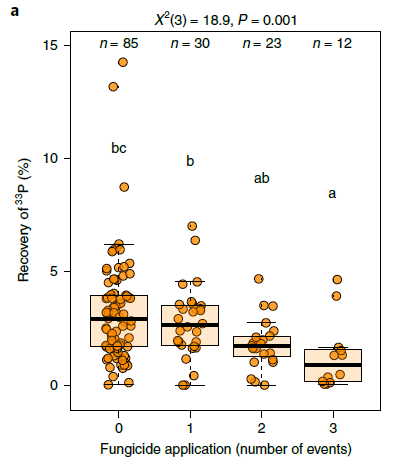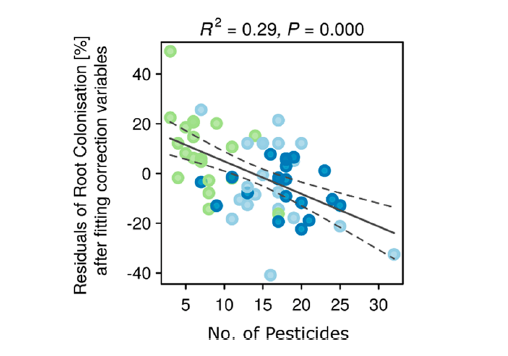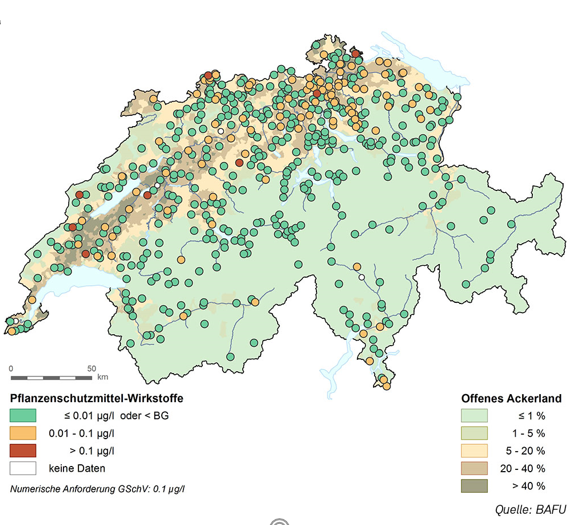
Unseen and hidden effects of pesticides: pesticide suppress natural soil fertilizers.
Our new study in @NaturePortfolio demonstrates that pesticides suppress the natural nutrient uptake capacity of beneficial mycorrhizal fungi with 42%.
nature.com/articles/s4155…
Our new study in @NaturePortfolio demonstrates that pesticides suppress the natural nutrient uptake capacity of beneficial mycorrhizal fungi with 42%.
nature.com/articles/s4155…

This result is important because 70% of all land plants and many crops form a beneficial symbiosis with #mycorrhizal fungi. The fungi supply nutrients to the plant in return for sugars and fatty acids. They do this through highly sophisticated arbuscules in plant cells. 

This study confirms our previous study showing that the abundance of beneficial mycorrhizal fungi is strongly and negatively linked to the number of pesticides in arable soils.
pubs.acs.org/doi/10.1021/ac…
pubs.acs.org/doi/10.1021/ac…

Pesticide effects worked in two ways: the diversity and richness of mycorrhizal fungi was 50% lower in plots where fungicides had been applied and fungicides reduced the natural nutrient uptake capacity.
nature.com/articles/s4155…
nature.com/articles/s4155…

We already found out that synthetic pesticides are widespread in soil and we found up to 16 different pesticides after 20 years of organic management – and we only analysed 46 pesticides far less as the number being applied. 

A large study across Germany even demonstrated that all air samples analysed contained pesticides. Up to 36 different pesticide compounds were detected in the air, including pesticides not approved for use anymore. 

In Switzerland pesticides are also found in drinking water, especially in areas with intensive agricultural production. Many people are concerned about potential health effects. 

These findings are not surprising. Large amounts of pesticides are used worldwide and in some countries, over 20 kg per hectare and year are applied. With a 50% increase in pesticides use since the 90ies.
fao.org/3/cb3411en/cb3…
fao.org/3/cb3411en/cb3…

Pesticide use varies strongly among crops. For some #crops (fruit-trees, vinyards) >25 kg of pesticides are applied per hectare and year, which is a lot. For others (grassland) hardly any pesticide are applied. 

Farmers apply pesticides because they often work very well against pests and diseases. It is logical that farmers apply pesticides because they help to secure yield and #food security. However, many crops can be grown without pesticides.
sciencedirect.com/science/articl…
sciencedirect.com/science/articl…

For many crops there are cultivars that are (largely) resistant to #disease and with appropriate farming practices (e.g. crop rotation, mixed cropping) and weed control measures it is possible to drastically reduce pesticide use without yield or income loss.
Also organic farmers apply pesticides, but only those that are not synthetic and produced in nature. Still, some of these organically certified pesticides are harmful. However, negative effects are usually (not always) much lower compared to synthetic pesticides. 

Interestingly >150 different synthetic pesticides have been banned in Switzerland between 2005 & 2020 (source BLW).
file:///C:/Users/U80793849/Downloads/Zur%C3%BCckgezogene%20Wirkstoffe%20Aus%20Anhang%201%20PSMV_20200701.pdf
file:///C:/Users/U80793849/Downloads/Zur%C3%BCckgezogene%20Wirkstoffe%20Aus%20Anhang%201%20PSMV_20200701.pdf
Society is more and more critical about the use of pesticides and this is reflecting in increased consumption of organic and pesticide free produced products (a growth of >50% in 5 years). In Switzerland 17% of agricultural land is under organic management (source Biosuisse). 

I assume that (big) companies selling synthetic #pesticides are getting nervous because their business model is under pressure when more and more farmers move to organic or pesticide free production.
It is logical that companies sell synthetic pesticides because there is still a big market and a large demand. What is very questionable is that several companies sell and produce pesticides that have been banned in many countries (e.g. CH, EU) because they are very harmful.
As long as such companies do sell banned pesticides, simply to make profit, there are no arguments to trust such companies, even if they focus more on #sustainability, #soil health or #biodiversity.
This tweet thread is written by Marcel van der Heijden (Professor for Agroecology) and these comments reflect my personal opinion, not necessarily those of Agroscope, University of Zurich or Utrecht University
• • •
Missing some Tweet in this thread? You can try to
force a refresh



